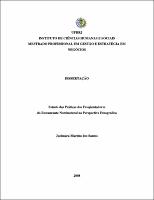Please use this identifier to cite or link to this item:
http://rima110.im.ufrrj.br:8080/jspui/handle/20.500.14407/15201| Tipo do documento: | Dissertação |
| Title: | Estudo das práticas dos freqüentadores do restaurante Nutrinatural na perspectiva etnográfica |
| Other Titles: | Study practices of the restaurant Nutrinatural dead in ethnographic perspective |
| Authors: | Santos, Jucimara Martins dos |
| Orientador(a): | Nogueira, Heloisa Guimarães Peixoto |
| Keywords: | consumo de alimentos naturais;comportamento do cliente;etnografia;fidelização de clientes;consumption of natural foods;customer behavior;ethnography;loyalty of customers |
| Área(s) do CNPq: | Administração |
| Idioma: | por |
| Issue Date: | 4-Sep-2008 |
| Publisher: | Universidade Federal Rural do Rio de Janeiro |
| Sigla da instituição: | UFRRJ |
| Departamento: | Instituto de Ciências Humanas e Sociais |
| Programa: | Programa de Pós-Graduação em Gestão e Estratégia |
| Citation: | SANTOS, Jucimara Martins dos. Estudo das práticas dos freqüentadores do restaurante Nutrinatural na perspectiva etnográfica. 2008. 114 f. Dissertação (Mestrado Profissional em Gestão e Estratégia) - Instituto de Ciências Humanas e Sociais, Universidade Federal Rural do Rio de Janeiro, Seropédica - RJ, 2008. |
| Abstract: | Não comemos apenas quantidades de nutrientes e calorias para manter o funcionamento corporal em nível adequado: o ato de comer compreende, também, formas de expressão e afirmação de identidades sociais. Envolve a seleção, as escolhas, as ocasiões e os rituais que podem ser organizados e classificados com vistas a compreender a dinâmica social que se desenrola na experiência humana do viver o dia-a-dia. Cultura e consumo, assim, são processos interligados e indissociáveis e só faz sentido discuti-las dentro de um esquema cultural específico. O objetivo deste estudo de caso foi compreender os processos que ocorrem no Restaurante Nutrinatural que estimularam, formal ou informalmente, a retenção e, logo, a fidelização dos clientes. O lócus da pesquisa foi o restaurante de comida natural self service a quilo, Nutrinatural. Para desenvolver o trabalho, precisamos contextualizar o lócus do estudo e o município em que ele se insere; descrever a estrutura e as formas de funcionamento do restaurante; identificar as situações que levam os clientes a retornarem ao restaurante; compreender os níveis de sociabilidade estabelecidos entre os clientes e os funcionários, os clientes e as proprietárias do restaurante. Optou-se por desenvolver um estudo de base qualitativa com perspectiva etnográfica através da co-visita diária ao restaurante. Esta co-visita se deu de uma a duas vezes por semana em dias e horários diferentes. O relato foi elaborado a partir da observação participativa e das conversas informais com os clientes nos horários de almoço, durante 11 meses (maio de 2007 a março de 2008), e através de entrevistas semi-estruturadas com 12 clientes que freqüentam o restaurante de forma contínua, e também com as proprietárias. Os resultados foram classificados segundo o princípio de saturação em 05 categorias. Comprovou-se que a tônica para o processo de fidelização, no estudo, está relacionada à sensação de estar em família ao se fazer as refeições no Restaurante Nutrinatural. A sociabilidade mostrou-se tão importante quanto a saudabilidade e o sabor. |
| Abstract: | Not only eat quantities of nutrients and calories to keep the body functioning at an appropriate level: the act of eating understands, too, forms of expression and affirmation of social identities. It involves the selection, the choices, the occasions and rituals that may be organized and classified in order to understand the social dynamics that takes place in the human experience of living day to day. Culture and consumption, thus, processes are interconnected and inseparable and only makes sense to discuss them within a specific cultural scheme. The objective of this case study was to understand the processes that occur in the restaurant that Nutrinatural stimulated, either formally or informally, retention and hence the loyalty of customers . The locus of the research was the natural food restaurant in the self-service kilo, Nutrinatural. To develop the work, we need to contextualize the locus of the study and the city where he falls; describe the structure and ways of operating the restaurant, identifying the situations that lead customers to return to the restaurant; understand the levels of sociability established between customers and employees, customers and the owners of the restaurant. We chose to develop a study with the basic qualitative ethnographic perspective through coday visit to the restaurant. This co-trip took one to two times per week on different days and times. The report was prepared from the participatory observation and informal conversations with customers in time for lunch, for 11 months (May 2007 to March 2008), and through semi-structured interviews with 12 clients who attend the restaurant so continuous, and also with the owners. The results were classified according to the principle of saturation in 05 categories. It has been proved that the keynote to the process of loyalty in the study, is related to the feeling of being in the family is doing Nutrinatural meals in the restaurant. The sociability proved to be as important as the health and flavor. |
| URI: | https://rima.ufrrj.br/jspui/handle/20.500.14407/15201 |
| Appears in Collections: | Mestrado Profissional em Gestão e Estratégia |
Se for cadastrado no RIMA, poderá receber informações por email.
Se ainda não tem uma conta, cadastre-se aqui!
Files in This Item:
| File | Description | Size | Format | |
|---|---|---|---|---|
| 2008 - Jucimara Martins dos Santos.pdf | 4,82 MB | Adobe PDF |  View/Open |
Items in DSpace are protected by copyright, with all rights reserved, unless otherwise indicated.

